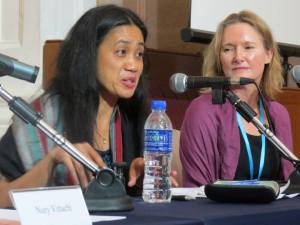 ‘She was trying to capture the wild – the essence of leaf, flower and bird.’ Jen, the protagonist of Inga Simpson’s book, ‘Nest’ is an artist, a drawer of birds. After a relationship breakup and her mother’s death, Jen returns to the town she grew up in. There, she regenerates her patch of land and draws the many birds attracted by her birdbath.
‘She was trying to capture the wild – the essence of leaf, flower and bird.’ Jen, the protagonist of Inga Simpson’s book, ‘Nest’ is an artist, a drawer of birds. After a relationship breakup and her mother’s death, Jen returns to the town she grew up in. There, she regenerates her patch of land and draws the many birds attracted by her birdbath.
Jen leads an isolated life. With the exception of her young pupil Henry, who she is teaching to draw, she has little social contact. It is through Henry that she learns a girl from the town has gone missing. The loss of Caitlin brings back memories from Jen’s past and another missing child, Michael.
The mystery of the missing children provides a dark undercurrent to Jen’s simple life on her property. As we get to know Jen we learn more about the hurts she is holding inside. Returning home requires her to come to terms with her own history, in particular the disappearance of her father. Revelations fall one on top of the other as the story unfolds.
One of the delightful things about this book is the way it immerses us in the natural world. Inga is an accomplished nature writer and her love of wild places comes out through her character’s observations. The birds and the bush are described in warm detail – ‘The limbs of the brush-box tended to horizontal, like a reaching arm, and their leaves were large and flattish. They not only held the sunlight, but emitted a glow of their own, as if illuminated from within.’
Jen is a complex character whose relationship with Henry is touching and authentic. A lover of nests and tall trees, she learned to climb into the canopy with her former partner, Craig – ‘… once up in the mist, among salamanders and lichens and liverworts barely seen by another human being, she had found her tree legs.’
Like Inga’s previous novel, ‘Mr Wigg’, ‘Nest’ is a gently told book, written in simple, evocative prose. Despite the missing children, it is optimistic and full of a childlike sense of wonder at our world. The story plays out at a steady pace with the lost children adding a page-turning backbone. Reading ‘Nest’ left me with a hankering to curl up a tree and have the wind blow me to sleep.
Inga Simpson will be appearing at the Byron Bay Writers Festival this weekend. Read more about Inga here.
This is my fourth review for the Australian Women Writers Challenge 2014.




